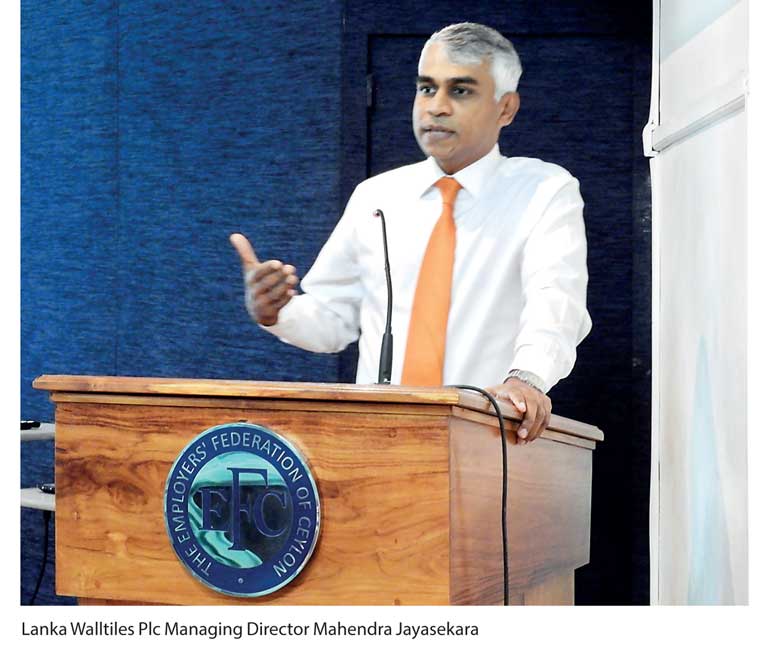Friday Feb 20, 2026
Friday Feb 20, 2026
Wednesday, 4 April 2018 00:00 - - {{hitsCtrl.values.hits}}
 Lanka Walltiles Plc Managing Director Mahendra Jayasekara, while speaking at the recent EFC HR/IF Forum, called on companies to be proactive and honest in their decision-making rather than being solely reliant on labour law reform.
Lanka Walltiles Plc Managing Director Mahendra Jayasekara, while speaking at the recent EFC HR/IF Forum, called on companies to be proactive and honest in their decision-making rather than being solely reliant on labour law reform.
“Rather than focusing only on labour law reforms, companies should reform themselves - the way they do business, the way they look at employees. Management should be courageous to make decisions such as closing down of a business, retrenching persons, when the company can afford such decisions. They should not wait until the company is drained of its resources and collapses to make decisions,” said Jayasekara.
Jayasekara made these remarks during his keynote address at the EFC HR/IR Forum powered by Unilever Sri Lanka and Glaxosmithkline Sri Lanka. The event, organised under the banner of ‘Labour Law Reforms from a Business Perspective’, marked the first of the EFC’s HR/IR series for 2018.
Remarking that labour laws should be aimed at enhancing “national competitiveness” and at the same time be fair by both the employee and employer, Jayasekara maintained that it was an outdated notion for the private sector to moot relaxed and flexible labour laws.
The private sector does not require law reforms to facilitate the hiring and firing of employees given the fact that recruitment is an expensive process.
“The intention of the employer is to retain the employee in the organisation,” said Jayasekara, who went on to note that at the same time companies should be able to get rid of unwanted or excess labour, for instance employees who become redundant before the advent of new technology.
Citing the retrenchment experience of Lanka Walltiles Group about 15 years ago, its present Managing Director said: “When employees attached to Lanka Ceramic had to be retrenched, the management of Lanka Walltiles did not feel the limitations imposed on them by the labour law. However, when the Group was undergoing another restructuring process in recent years, it was felt that the law was a limitation since the labour authorities saddled the company with a massive amount of compensation to be paid to affected employees.”
He also noted that the private sector demanded a “democratic way” of going ahead with industrial action to safeguard against situations which would otherwise be dictated by the ulterior motives of individuals and political affiliations of trade unions.
Underscoring that employee welfare boosts business, he alluded to the recent intervention by his organisation to have ‘sleeping parlours’ in some of the factories to enable the employees a short nap after lunch. Not only do interventions of this nature increase productivity at work, but they also paint a positive image of the management among employees, he noted.
Dismissing the argument that the many holidays in the country had created an impediment to doing business, the senior business professional also noted that a closer look into the matter would reveal otherwise.
“The law for manual grade workers only provides for 14 days of annual leave which is not a sufficient quantum, considering the present-day requirements of the employees.”
In his remarks, Jayasekara also called for legislation that facilitates entrepreneurship.
“Liberalisation of other areas of the law is priority while providing for employee welfare is mandatory,” he added.
EFC Director General Kanishka Weerasinghe stated that some labour market reforms had been listed on the agenda of the NLAC and the EFC has been lobbying for simplifying the labour laws over the years as well as for the accommodation of new types of employment or work that has emerged. The EFC has also been revisiting the current laws such as those on the restructuring of organisations and mooting the changes looking at the requirements of the businesses, he said.
The forum was wrapped up with an interactive session between the participants and the senior professionals of the EFC during which general issues relating to employee relations and human resources were raised and discussed.